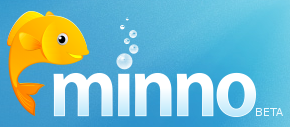 We’re entering another round of testing in the paywall/microtransactions world, but it doesn’t look to be turning out any better than the last one. I argued that until payment methods are improved, everyone is just whistling in the dark, but that hasn’t stopped the NY Times from taking another shot at it, and The Daily from trying a whole new format. The necessary precursor to any of these schemes, however, is a simple, easy, and generally agreed-upon payment system — an e-wallet.
We’re entering another round of testing in the paywall/microtransactions world, but it doesn’t look to be turning out any better than the last one. I argued that until payment methods are improved, everyone is just whistling in the dark, but that hasn’t stopped the NY Times from taking another shot at it, and The Daily from trying a whole new format. The necessary precursor to any of these schemes, however, is a simple, easy, and generally agreed-upon payment system — an e-wallet.
Minno seems to feel this is true as well, and are hard at work making a payment tool they feel is as simple and powerful as cash, without the political and regulatory trappings of bank-related NFC schemes or credit card tie-ins. It’s simple, all right, but is it powerful enough?
The idea is to remove as many obstacles as possible from between the user/buyer and the seller. Thus, Facebook connect is employed, no card or bank account need be tied to the account, and the payment plugin is just a line of javascript. It’s not aimed at real-life situations or point-of-service, as NFC is, and it doesn’t have a “twist” like Flattr or Bitcoin. It’s not an alternate currency and it doesn’t come with a built-in community. I could do without the whimsical aquatic theme, but other than that: so far, in my opinion, so good.
 It’s built by a couple guys who left Google to pursue this project, and who think that there will be a place for this kind of payment system, mainly for purchasing online works like subscriptions, single articles, media and books (directly from the creators, for example Project 7 Alpha), and web app functionality (as demonstrated by the Torrent Traveler demo app). It’s fundamentally a different market than that for NFC and expedited credit and debit payments, and requires a less extensive (though no less secure) infrastructure.
It’s built by a couple guys who left Google to pursue this project, and who think that there will be a place for this kind of payment system, mainly for purchasing online works like subscriptions, single articles, media and books (directly from the creators, for example Project 7 Alpha), and web app functionality (as demonstrated by the Torrent Traveler demo app). It’s fundamentally a different market than that for NFC and expedited credit and debit payments, and requires a less extensive (though no less secure) infrastructure.
The plugin and system look good, and I think that for now there is definitely an emerging opportunity for point-to-point money transfers on the web. A sane monetization plan will help, too, and Minno wisely isn’t planning on draconian minimum fees or 30% transfer scrapes. But timing and placement matter, and I’m less confident that Minno will be in the right place with the right clout when this field really takes off.
Maybe it’s looking too far out, but I think that a transfer of funds between two unique IDs on the internet is likely to be standardized into a fundamental protocol. Until that time, I find it unlikely that it’s going to be branded, or rather a brand that grows into prominence, as Facebook and PayPal have. It seems that whenever money is changing hands (even if it’s pennies), big interests tend to step in, and regulation gets involved as well. Not to mention that potential business models and the market they exist in are neither of them even close to solidified yet. We’re looking at serious changes to the way money and the web interact over the next few years.
The bigger companies aren’t nearly agile enough to offer an actual product after just a few months of development, as Minno is doing, but they’re going to come to market with a product that is, if not actually superior, still carries more weight. Banks, VISA, Apple, Google, PayPal — every one of these monsters has good reason to be spending millions on a successor system to the holdover online payment methods we’ve had in place for 15 or 20 years now. It’s a David vs. Goliaths situation, and I’m not holding out much hope for David.
To their credit, Minno has a system that plainly works; at the moment they’re short on partners (no one wants to go with a newcomer like this on faith) and the ability to scale and provide service, customization, and behind-the-scenes wirework to large and important customers (like if, say, a large blog network or media conglomerate were to use Minno) is by necessity unproven.
The micropayments world is going to be one of these billion-dollar businesses everyone likes to talk about (and get in at the ground floor of). But the battle will be hot amongst the heavyweights, and Minno may find themselves (as they seem to have inadvertently set themselves up to be) a small fish in a big pond.






























Comment